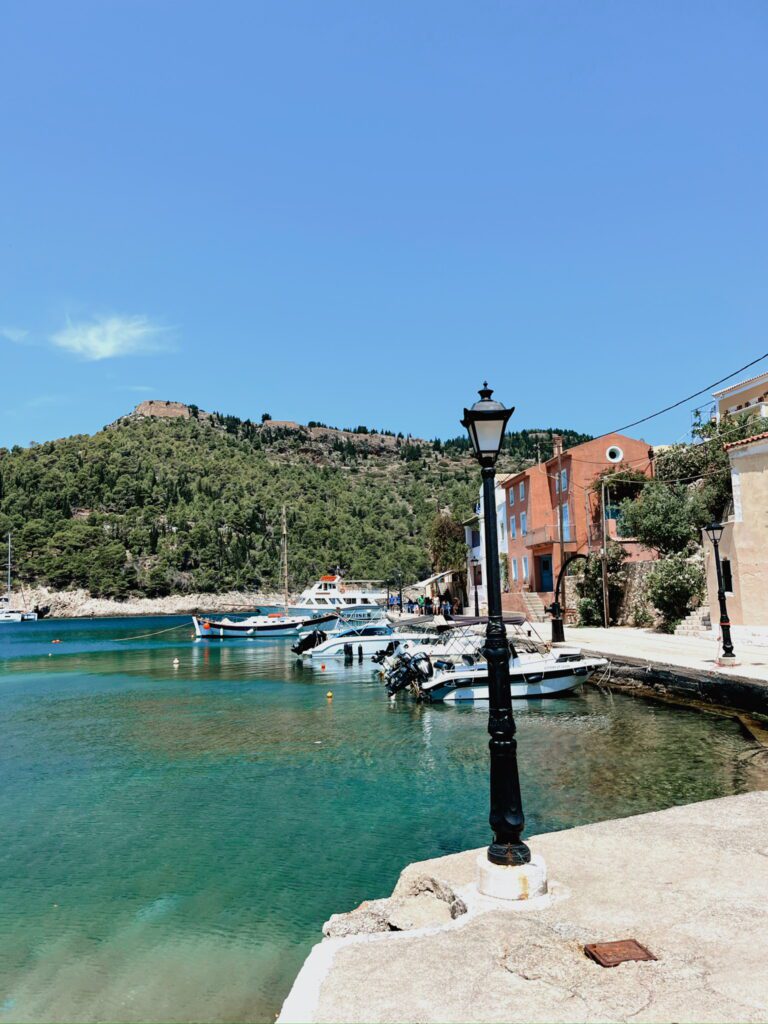Greece, a land of ancient wonders and stunning landscapes, offers an unforgettable blend of history, culture, and Mediterranean charm. This travel guide covers everything you need to know—from the best time to visit and navigating local customs to must-see attractions and practical tips for a seamless adventure.
- Best Time to Visit: Climate, Crowds & Prices
- Local Culture & Etiquette: Cultural Norms, Language, Etiquette – Visiting Religious Sites
- Money Currency & Payments
- Accommodation Options: Types of Accommodations, Recommendation, Essential Apps
- Local Cuisine
- Transportation: Transportation Options, Essential Travel Apps
- Safety & Health: Tap Water Conditions, Health Precautions, Emergency Informations, Safety Tips
- Visa Requirements
- Staying Connected: Getting a SIM Card in Greece
- Top Attractions & Activities
1
Best Time to Visit
Climate
Greece enjoys a Mediterranean climate with hot, dry summers and mild, wet winters, making it an appealing destination year-round.
The best weather typically occurs between late April and early October, with sunny days and temperatures ideal for beach days and island hopping. Coastal and island areas, such as Santorini or Mykonos, often see temperatures ranging from 25°C to 35°C in the summer, while inland cities like Athens can get even hotter during July and August.
Spring (April-May) and early autumn (September-October) are particularly pleasant for sightseeing and outdoor activities, as the weather is warm but not excessively hot. Winter (November-March) brings cooler temperatures, particularly in northern regions like Thessaloniki, and more frequent rain, though it remains milder than in many other European countries.
Crowds & Prices
The high season in Greece runs from June to August, when the islands and coastal regions are bustling with tourists. During these months, expect higher prices for accommodations, packed beaches, and crowded attractions, especially in popular destinations like Santorini or Athens. This is also when Greece’s vibrant nightlife scene is at its peak.
The shoulder seasons of April to June and September to October are ideal for travelers seeking a balance between pleasant weather and fewer crowds. Prices for flights and accommodations are more affordable, and you’ll find shorter lines at major attractions. Spring offers blooming landscapes, while autumn brings a more relaxed vibe as the summer crowds dissipate.
Winter (November to March) is the least crowded time to visit Greece, with significantly lower prices for accommodations and flights. While the islands are quieter, cities like Athens and Thessaloniki remain lively, offering a more local experience. However, some island destinations may have limited services, and the weather can be rainy and cloudy, making it less suitable for outdoor or island-focused activities.
2
Local Culture & Etiquette
Cultural Norms
Greek culture is deeply rooted in family, respect, and tradition, with strong ties to Orthodox Christianity and an emphasis on hospitality, known as “philoxenia.” Locals are generally warm and welcoming, especially if you show an interest in their customs and traditions. It’s common to greet people with a handshake or, among friends and family, with a kiss on both cheeks.
Time in Greece is often more relaxed, particularly in social settings, so don’t be surprised if events or gatherings start a bit later than scheduled. Dining is an essential part of social life, with meals often enjoyed at a leisurely pace, especially dinner, which is typically the main meal of the day and can last well into the evening.
Language
The official language of Greece is Greek, and while English is widely spoken in tourist areas and major cities like Athens, Santorini, and Thessaloniki, learning a few basic Greek phrases is highly appreciated. A simple “efharistó” (thank you) or “kaliméra” (good morning) goes a long way in showing respect for the local culture.
In smaller villages or less touristy areas, English speakers may be less common, so having a translation app or a phrasebook can be very useful.
Etiquette – Visiting Religious Sites
Greece’s religious heritage is central to its culture, with countless monasteries, churches, and chapels scattered throughout the country. When visiting these sites, modest dress is essential out of respect. Visitors should cover their shoulders and knees, and hats should be removed before entering.
Many churches are active places of worship, so it’s important to speak softly and maintain a respectful demeanor. Photography is often allowed, but it’s wise to check for signage or ask before taking pictures. If a service is taking place, it’s polite to stand quietly at the back or outside to avoid causing disruption.
3
Money Currency & Payments
When traveling to Greece, understanding the local currency and payment methods is essential for a smooth and stress-free experience. Here’s everything you need to know about handling money during your trip.
The Euro (€): The Local Currency
Greece uses the Euro (€), the same as most European countries. Banknotes are available in denominations from 5€ to 500€, while coins range from 1 cent to 2€. Coins are commonly used for small transactions like public transportation, coffee shops, or public facilities.
Exchange Rates
Exchange rates fluctuate regularly, so check the current rate before traveling. As a general guide, 1€ is often close to $1.50 CAD or $1.10 USD, but rates can vary.
Currency Exchange
To save on exchange fees:
- Exchange your money at your local bank before departing.
- Use ATMs in Greece with your card and refuse the offered exchange rate. This ensures your home bank determines the conversion rate, which is often better.
- Avoid street currency exchanges, as they may have unfavorable rates or hidden fees.
ATM Withdrawal Limits
ATMs in Greece often have withdrawal limits per transaction, typically between 400€ and 600€ (590$–880$ CAD). If you need more cash, multiple withdrawals are possible but may incur additional fees.
ATM Fees
Your home bank may charge fees for international withdrawals, and local Greek banks may add their own charges. To minimize fees:
- Withdraw larger amounts at once.
- Contact your home bank before your trip to understand their policies regarding international ATM withdrawals.
Security Tips for ATMs
- Use ATMs located inside banks, shopping centers, or other secure locations.
- Avoid standalone ATMs in touristy or remote areas.
- Check for unusual devices attached to ATMs and cover your PIN when entering it.
Card Payments, Minimum Spend & Transaction Fees
Visa and Mastercard are widely accepted across Greece, including restaurants, shops, and hotels. However:
- American Express and other cards may not be as commonly accepted, especially in smaller towns or local businesses.
- Many establishments may have a minimum spend for card payments, usually around 10€–20€.
- Foreign transaction fees may apply to card purchases, so check with your bank beforehand to avoid surprises.
Tipping Etiquette in Greece
Tipping is appreciated but not obligatory in Greece. Here’s what to expect:
- Restaurants: Rounding up the bill or leaving 5–10% is common for good service. In casual settings, rounding up change suffices.
- Taxis: Tipping is not expected, but rounding up to the nearest euro or leaving an extra euro or two is courteous.
- Hotels: Tip 1–2€ per bag for bellhops or per day for housekeeping.
- Tour Guides: A tip of 10–15% of the tour price is a polite gesture for excellent service.
4
Accommodation Options
Choosing your accommodation can significantly impact your travel experience. To help you make the best decision, here’s a breakdown of the three main types of accommodations, with a recommendation from my past trip and essential apps that will make booking these stays easier for you!
Types of Accommodations
- Villas: Renting a villa is by far the most visually stunning option, offering unique and original stays that can be truly memorable. Villas are usually equipped like apartments, complete with a kitchen and fridge, allowing you to prepare your own meals. While villas tend to be pricier, you can save money by cooking rather than dining out every day. This option is especially ideal for families or large groups, as splitting the cost can make it more affordable and enjoyable than staying in separate hotel rooms.
- Hotels: Hotels are a classic choice with a wide range of options to suit different budgets. Staying in a hotel offers you the comfort of daily housekeeping, room service, and access to various amenities that you won’t find in a villa, such as spas, yoga classes, and more. If you value security and convenience, hotels are a great option, especially for those who prefer having staff available around the clock to assist with any needs.
- Hostels: For backpackers and budget travelers, hostels are the most economical choice. While they may lack the luxury and comfort of villas or hotels, hostels offer a unique and social experience, perfect for young travelers. You’ll typically have a bed in a shared dormitory, making it an excellent way to meet new people, especially if you’re traveling solo. Many hostels also organize group activities to help guests connect. If you’re young and willing to trade a bit of comfort for a memorable and social experience, hostels are the way to go.
Recommendation
Kefalonia: During my trip, I stayed in a Airbnb in Lixouri, and I can confidently say it lives up to its glowing 4.97-star rating. Centrally located, it’s just a 2-minute walk from the ferry and the heart of Lixouri, making it incredibly convenient. The apartment itself is bright, spotless, and equipped with everything you might need for a comfortable stay. The outside patio was a lovely bonus, perfect for relaxing after a day of exploring. To top it all off, the host was incredibly kind and accommodating, making the experience even better. I couldn’t recommend this place more! Click here to view theAirbnb.
Essential Apps
- Booking.com: This app offers a wide range of accommodations, including hotels, hostels, and villas, all in one place.
- Airbnb: Perfect for finding unique and original villas or apartments that offer a home-like experience.
- Hostelworld: Specializing in hostels, this app features an excellent rating system to help you choose the best option. It also includes group chats where you can connect with others who will be staying at the same hostel.
Extra Recommendation: Once you’ve found a place you like, especially with hotels and hostels, be sure to visit their official website. Often, you can find exclusive discounts when booking directly through them.
Stay connected! Follow us on social media for exclusive content & updates on our travels.
On our website, you’ll find all the essential information and tips, while on our social media, you’ll get even more – including personal experiences, funny moments, stunning videos, and much more!
5
Local Cuisine
Greek cuisine is celebrated for its fresh, Mediterranean ingredients and deep-rooted culinary traditions. Here are the basics you need to know:
- Seafood: Greece is famous for its fresh seafood, with dishes like grilled octopus, fried calamari, and freshly caught fish being staples in coastal areas and islands. These dishes are prepared simply to let the natural Mediterranean flavors shine.
- Souvlaki: Grilled meat skewers, often served with pita bread, veggies, and a side of tzatziki sauce, are a staple of Greek street food and a must-try for meat lovers.
- Gyros: A pita filled with seasoned meat, fresh vegetables, and creamy tzatziki sauce, gyros are an iconic and satisfying Greek street food.
- Moussaka: A baked dish featuring layers of eggplant, minced meat, and rich béchamel sauce, moussaka is a hearty and flavorful Greek classic.
- Kokkinisto: A slow-cooked beef dish simmered in a tomato-based sauce, kokkinisto is a comforting and traditional meal that highlights the richness of Greek cuisine.
Desserts & Drinks
- Baklava: A sweet pastry made with layers of phyllo dough, honey, and nuts, baklava is a quintessential Greek dessert loved for its rich, sticky sweetness.
- Loukoumades: These golden fried dough balls, drizzled with honey and sprinkled with cinnamon, are a delightful treat for anyone with a sweet tooth.
- Ouzo: This anise-flavored spirit is a traditional Greek drink that pairs perfectly with seafood and other savory dishes.
- Assyrtiko Wine: A crisp and refreshing Greek white wine, Assyrtiko is an excellent accompaniment to seafood and lighter dishes.
- Loux Sparkling Lemonade: Made with Greek lemons, this sparkling beverage offers a refreshing, non-alcoholic option that perfectly complements Greek cuisine.
6
Transportation
Navigating Greece is easy, with various transportation options to suit your travel style, whether you’re exploring the mainland or the islands. Here’s a detailed guide on the best ways to get around:
1. Planes
Domestic flights are the fastest way to travel between Athens, and many of the islands, making them ideal for saving time. Greece’s main airlines, such as Aegean Airlines and Sky Express, offer frequent flights to destinations like Santorini, Mykonos, Crete, and Rhodes. Smaller regional airports also connect less-touristy islands, such as Kefalonia and Naxos.
Tips:
- Book tickets early during peak travel seasons (June to September) to secure the best prices. Check out Google Flights: The Ultimate Guide To Finding And Booking Cheap Flights for the best method.
- Domestic flights from Athens are usually around 30–60 minutes, making them a time-efficient option.
- Keep an eye on baggage policies, as budget airlines may have strict weight limits.
2. Trains
While Greece’s train network is not as extensive as some other European countries, it is reliable for specific routes, especially connecting Athens to Thessaloniki via the high-speed Intercity trains. These trains are comfortable and offer an efficient way to travel between major cities. Tickets can be booked online or at train stations.
3. Buses
The national KTEL bus system is the most comprehensive option for reaching towns and villages not served by trains. KTEL buses are affordable, reliable, and well-maintained. They connect major hubs like Athens, Thessaloniki, and Patras with smaller cities and coastal towns.
Pro Tip: For island connections from Athens, KTEL buses often coordinate with ferry schedules to ports like Piraeus, Rafina, and Lavrio.
4. Public Transportation in Cities
- Athens: The metro system is clean, modern, and efficient, connecting key areas like the airport, city center, and Piraeus port. Buses, trams, and trolleys complement the metro, offering coverage throughout the city.
- Thessaloniki: A robust bus network serves this northern city, and a metro system is under development.
- Island Towns: Public buses operate in popular islands like Mykonos, Santorini, and Crete, connecting key beaches and tourist areas.
5. Ferries
Ferries are the lifeline of Greece’s islands, connecting them with the mainland and each other. Major ferry ports include Piraeus (Athens), Rafina, and Thessaloniki, with regular services to islands like Santorini, Mykonos, Crete, and Rhodes.
Popular Ferry Companies:
- Hellenic Seaways
- Blue Star Ferries
- Minoan Lines
- Aegean Speed Lines
Booking Tip: Reserve tickets online on platforms like Omio, especially in summer, and opt for high-speed ferries for shorter travel times.
6. Renting a Car, Scooter, or Quad Bike
Renting a vehicle is one of the best ways to explore Greece at your own pace, particularly on islands like Crete, Kefalonia, and Rhodes. Roads are generally well-maintained, though some remote areas may have narrower or unpaved roads.
Tips:
- An international driver’s license is required.
- Book in advance during the high season (June to August).
- Always check for insurance coverage and road assistance in rental agreements.
Recommended Rentals: Look for reputable companies such as Avis, Hertz, or local options like Velox Rentals and JoyRide Kefalonia.
7. Taxis & Ride-Sharing
Taxis are widely available in cities and tourist hotspots. In Athens, ride-sharing services like Uber and Beat offer competitive pricing and convenience. Always ensure the meter is running or agree on a fare beforehand to avoid overcharging.
8. Essential Travel Apps
- Omio & Ferryhopper: Compare and book trains, buses, and ferry tickets across Greece.
- KTEL App: For bus schedules and tickets.
- Google Maps & Maps.me: Ideal for navigating urban and rural areas.
- Beat & Uber: Reliable for booking taxis in Athens and other major cities.
7
Safety & Health
When traveling to Greece, it’s important to be aware of both safety and health precautions to ensure a smooth and enjoyable trip. Below are three things to consider: the tap water conditions, other health precautions, and emergency information.
Tap Water Conditions in Greece
In Greece, tap water is generally safe to drink in major cities like Athens and Thessaloniki. However, on many Greek islands, tap water is not potable due to high mineral content or limited treatment facilities. It is advisable to use bottled water for drinking and cooking in these areas. Bottled water is inexpensive and widely available.
Emergency Information
Greece has a well-established healthcare system, and emergency services are generally reliable, particularly in urban areas. However, healthcare facilities on smaller islands may be limited.
Emergency Numbers
- Emergency services (police, fire, ambulance): 112 (this number works EU-wide).
- Tourist Police: 1571 (for assistance specifically for tourists).
Hospitals and Clinics
Major cities such as Athens, Thessaloniki, and Heraklion (on Crete) have modern hospitals with English-speaking staff. On islands and in rural areas, smaller health centers can provide basic care, but for more serious issues, you may need to travel to a larger facility. Having comprehensive travel insurance is highly recommended to cover potential medical costs.
Pharmacies
Pharmacies are plentiful and easy to locate in Greece. They are typically open from 8 am to 2:30 pm and reopen in the evening from 5:30 pm to 9 pm, though hours may vary. In tourist areas and major cities, some pharmacies offer 24-hour services, which are clearly marked on rotation boards. Greek pharmacists are well-trained and can assist with over-the-counter medications and minor health concerns.
Language and Communication
Many medical professionals in Greece, especially in tourist regions, speak English. Nonetheless, it’s a good idea to carry a list of your medical details translated into Greek, particularly if you have specific health concerns or prescription medications. Pharmacies and healthcare providers are accustomed to assisting tourists, but preparation can help facilitate communication in case of an emergency.
Safety Tips
Every traveler needs to be cautious, especially if you are solo traveling. We wrote an entire article giving you our best safety tips. Make sure to come back at the end of your reading to read our article Top Safety Tips for Solo Travelers: How to Stay Safe & Confident.
8
Visa Requirements
Greece is a member of the Schengen Area, which means the visa requirements for entering the country are largely determined by this agreement. The rules vary depending on your nationality and the length and purpose of your stay. Here’s what you need to know:
Short Stays (Up to 90 Days)
For tourism, business, or short-term stays, citizens of many countries do not need a visa to enter Greece for up to 90 days within any 180-day period. This includes travelers from:
- EU/EEA/Swiss nationals: These citizens do not need a visa and can stay for as long as they want.
- Citizens from visa-exempt countries: Travelers from countries such as the United States, Canada, Australia, New Zealand, Japan, and South Korea, among others, can enter Greece without a visa for up to 90 days. This rule applies across all Schengen countries, so the 90 days is cumulative across all Schengen countries visited during that period.
During your stay, you will need:
- A passport valid for at least three months beyond your intended departure date.
- Proof of sufficient funds for your stay and onward or return travel, if requested.
Visa Required for Longer Stays or Specific Purposes
If you plan to stay in Greece for more than 90 days, or if your purpose of travel is not covered by the visa-exempt category, you will need to apply for a long-stay visa. Here are some of the most common types:
- Work Visa: Required if you intend to work in Greece.
- Student Visa: Required if you’re studying in Greece for more than 90 days.
- Long-Stay Visa (D-Visa): Required for any stay longer than 90 days, typically for employment, study, family reunification, or retirement.
ETIAS Requirement for Short Stays
Starting in 2024, travelers from visa-exempt countries, including the U.S., Canada, and Australia, will need to apply for an ETIAS (European Travel Information and Authorization System) before entering Greece or any other Schengen country. ETIAS is not a visa but a travel authorization for short-term stays (up to 90 days). The application process is done online, and ETIAS is valid for up to three years or until your passport expires.
Visa Costs and Application Process
- Short stays (up to 90 days): Most visitors from visa-exempt countries do not need to pay for a visa, but may need to apply for ETIAS from 2024 onwards.
- Long-stay visas: Fees for long-stay visas (D-Visa) typically range from €100 to €120, depending on the purpose of your stay.
To obtain a long-stay visa, you must apply at the Greek embassy or consulate in your home country well in advance of your travel dates, as processing times can vary.
9
Staying Connected
Staying connected while traveling in Greece is easy and affordable, with several options for purchasing a local SIM card. Whether you need data for navigation, communication, or simply staying in touch with friends and family, getting a Greek SIM card is a practical solution.
Major Mobile Providers
Greece has three main mobile providers that offer prepaid SIM cards, all with reliable nationwide coverage, including islands and rural areas popular among tourists:
- Cosmote
- Vodafone Greece
- Wind (now part of Nova)
Each of these providers offers a range of prepaid plans that include data, calls, and texts. You can choose from daily, weekly, or monthly packages based on the length of your stay and usage needs.
Where to Buy a SIM Card
You can easily purchase a SIM card at various locations in Greece:
- Airport: Upon arriving in Greece, you’ll find SIM card kiosks or stores in the arrivals areas of major airports like Athens, Thessaloniki, and Heraklion. However, these kiosks have higher prices than those you can find in cities.
- Shops and Kiosks: SIM cards are widely available at mobile provider stores, electronics shops, and kiosks located in city centers, tourist hubs, and shopping malls.
- Supermarkets and Convenience Stores: Large supermarkets and convenience stores like AB Mini Markets often sell prepaid SIM cards, making it easy to pick one up while shopping.
Make sure to bring your passport, as identification is required to register the SIM card, in line with European regulations.
Cost and Plans
Prepaid SIM card prices in Greece are affordable:
- Data Plans: Prices typically range from €10 to €30, depending on the data package you select. Most plans offer generous data allowances (between 5 GB and 30 GB), and some plans may include free usage for popular apps or services.
- Calling and Texting: Many prepaid plans include local calls and texts, and some also offer international calling minutes. If you need frequent international calling, look for plans with international minutes or consider adding an extra calling package.
10
Top Attractions & Activities
Whether you’re seeking adventure, relaxation, or a journey into ancient history, Greece offers a captivating array of attractions and activities that showcase its breathtaking landscapes and its pivotal influence on Western civilization. Here are three must-see highlights:
Don’t want to miss out on our latest articles? Be sure to subscribe to our website, and you’ll receive a notification every time we publish something new!






